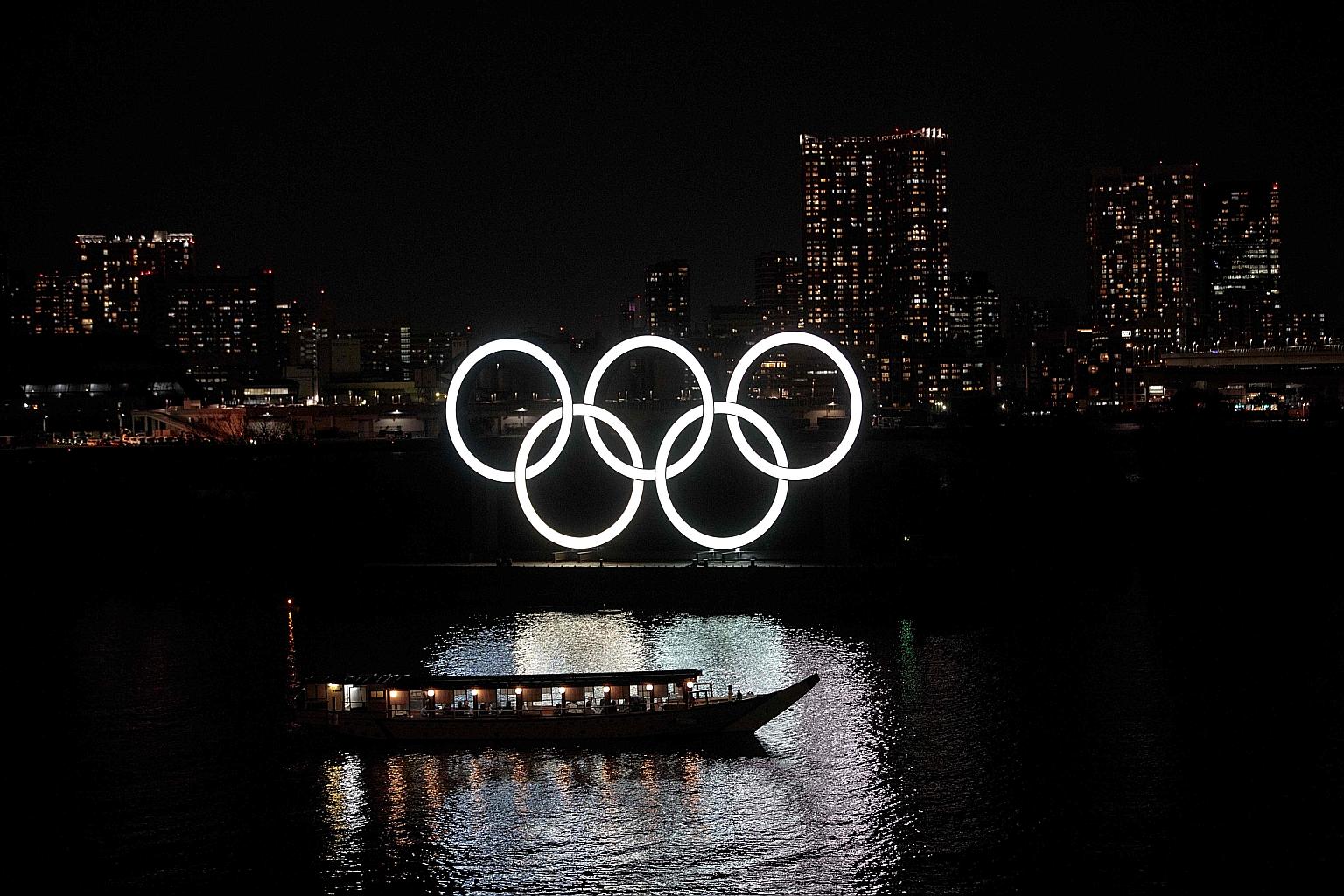Coronavirus pandemic
July date 'not feasible'
World Athletics chief Coe lends voice to growing chorus to postpone Olympics
Sign up now: Get the biggest sports news in your inbox

The Olympic rings flicker in Tokyo's Odaiba Marine Park, while clamour to extinguish hopes that Japan will hold the Games as scheduled in July grow ever louder.
PHOTO: AGENCE FRANCE-PRESSE
TOKYO • The International Olympic Committee (IOC) is due to make a decision on the fate of the July 24-Aug 9 Tokyo Games within four weeks, but its hand looks set to be forced much sooner.
World Athletics chief Sebastian Coe yesterday became the highest-profile sporting figure to call for the quadrennial multi-sport event to be postponed as it is "neither feasible nor desirable" owing to the global coronavirus pandemic.
In a letter addressed to IOC president Thomas Bach, he said: "Whilst we all know that different parts of the world are at different stages of the virus, the unanimous view across all our areas is that an Olympic Games in July this year is neither feasible nor desirable."
Coe holds massive sway in sport and his words, along with the groundswell of concern from national federations and athletes already struggling to train due to lockdown and social-distancing measures, appears to be tipping the balance towards an unprecedented rescheduling.
The Games has only ever been axed three times due to the world wars, and while cancellation has been categorically denied, the IOC and Japanese authorities now appear amenable to a postponement.
It looks inevitable after Australia and Canada quit the Games, signalling that they would not be participating unless the world's foremost sporting event was pushed to next year.
DELAY CALLS GATHER STEAM
In a statement on Sunday night, Canada's Olympic Committee said: "We are in the midst of a global health crisis that is far more significant than sport... (we) urgently call on the IOC... to postpone the Games for one year and we offer them our full support in helping navigate all the complexities that rescheduling the Games will bring."
A day later, Australia followed suit, with its Olympic Committee (AOC) unanimously deciding they could not send its athletes to Tokyo due to the Covid-19 crisis.
A board meeting decided a national team "could not be assembled in the changing circumstances at home and abroad" and should instead plan for the Olympics next summer.
"It's clear the Games can't be held in July," Australia's chef de mission Ian Chesterman said. "Our athletes have been magnificent in their positive attitude to training and preparing, but the stress and uncertainty has been extremely challenging for them."
AOC chief executive Matt Carroll said they were left without an option as the sweeping travel restrictions introduced by governments worldwide to slow down the spread of Covid-19 made training an "untenable situation".
"The IOC had adopted the key principles of putting athlete health first and ensuring it acted in their best interests and the interests of sport," he added. "This decision reflects those principles. We are now in a position where we can plan with greater certainty."
Reaction to both Australia and Canada's withdrawal were generally positive, with big-name athletes urging their respective associations and federations to do the same.
Olympic 100m breaststroke gold medallist Adam Peaty of Britain tweeted: "So the Canadians have pulled out of the Olympics and the Australians said they won't travel if the Olympics are held this summer, World Athletics have also put pressure on IOC to move.
"Let's hope (swimming governing body) Fina do the right thing in the next few days, not weeks."
Former Olympic hurdler Lolo Jones agreed it was the right call, tweeting "our health is more important than sport" before urging American officials to do the same.
Erica Wiebe, the Canadian Olympic champion in the women's 75kg freestyle wrestling, tweeted of her sadness at not being able to defend her gold medal, but felt her country was "standing on the right side of history" and asked the IOC to "put humanity first".
POLITICAL PRESSURE
Yesterday, a spokesman for British Prime Minister Boris Johnson told the IOC to "make a definitive decision soon to bring clarity to all of those involved", reiterating that "their health and safety must be absolutely paramount".
In response, Yoshiro Mori, the president of the Tokyo Olympics organising committee, admitted the clamour was impossible to ignore, although he was still hopeful the Games could be moved to later this year.
"At this moment, I can only say it should be 2020," he told reporters. "There are a lot of voices asking for the Games to be postponed. We are not so stupid as to hold the Olympics as scheduled.
"We will study carefully the options of postponement. Hopefully, all the details can be finalised in the next four weeks."
IMMINENT ANNOUNCEMENT
As such, broadcaster NHK yesterday said the Olympic torch relay, which was due to start on Thursday, will be drastically scaled back and converted into "a tour" until a formal decision is made.
The Games' fate now lies in the hands of Bach, who has the final say.
Michael Payne, his former IOC colleague and head of marketing for nearly two decades, feels postponement is his "only option".
Suggesting the indecision was because of Japan, who until recently still had hopes of hosting in July, the Briton added: "The problem is the rest of the world cannot get there... summer 2021 is the best option. Indeed the only option."
AGENCE FRANCE-PRESSE, REUTERS


